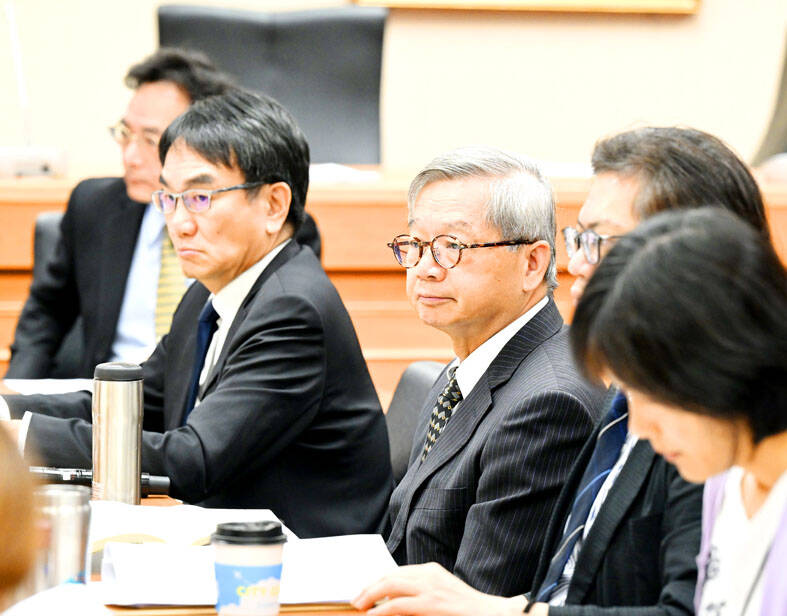Lawmakers yesterday completed an initial review of the draft of the “fundamental act of artificial intelligence” (AI) (人工智慧基本法), with most provisions left to be determined via cross-caucus negotiations.
The legislature’s Education and Culture Committee and Transportation Committee reviewed the bill at a joint meeting, but failed to reach a consensus on most provisions.
Only three provisions were passed with the title of the act determined at the meeting.

Photo: Lo Pei-de, Taipei Times
The committees had reviewed the bill at another meeting on June 11 and said that they would review it again after the Ministry of Digital Affairs submits the Executive Yuan’s version of the provisions by July 15, as requested by attending Democratic Progressive Party (DPP) legislators on that day.
However, the ministry did not submit a Cabinet version of the bill as of yesterday.
Chinese Nationalist Party (KMT) Legislator Ko Ju-chun (葛如鈞), who is also the convener of the meeting, expressed his discontent with the ministry. DPP legislators at the meeting did not give remarks.
Chinese Nationalist Party (KMT) Legislator Ko Chih-en (柯志恩) said the establishment of the act would significantly increase Taiwan’s competitiveness in the global AI landscape, but the Cabinet had failed to present a proposal.
The DPP government claimed that it would seize opportunities to develop AI technology, not only setting 2017 as Taiwan’s inaugural year for AI, but also to put forward strategies for AI scientific research, she said.
President William Lai (賴清德) presented a four-year AI action plan when he was the premier, and the administration of former president Tsai Ing-wen (蔡英文) unveiled the draft bill of the AI fundamental act in 2019, Ko said.
Despite all the fanfare and pressure from opposition parties over the past more than six years, the Cabinet did not present its version of the bill, she said.
“The executive branch said that cross-ministry negotiations were still required, but I don’t buy it,” Ko said, adding that the Executive Yuan would not be eligible to call itself an “AI Cabinet” or lead innovation in the tech industry, if it could not even handle the AI fundamental act.
KMT Legislator Huang Chien-hao (黃健豪) said the bill has been put on hold for eight years over three presidential terms.
The Executive Yuan remained passive even though the AI action plan was proposed by Lai when he was the premier in 2017, he said.
Huang said he had expressed concern over personal data protection on the execution level, but attending executive branch officials replied they could only “assist” with personal data protection, as the responsible agency of the Personal Data Protection Act (個人資料保護法) does not have authority beyond that.
That is not just a dereliction of duty, but a bureaucratic obstruction of the bill, he said.
The Executive Yuan’s responses to other issues raised by committee members, such as labor rights, data sharing, child and youth protection or preferential taxes, also showed that it was ill-prepared, Huang added.
The three approved provisions specified the government’s responsibility for promoting AI technology developments, providing incentives for relevant industries, and establishing an open data sharing mechanism for AI training.
Additional reporting by CNA

The inspection equipment and data transmission system for new robotic dogs that Taipei is planning to use for sidewalk patrols were developed by a Taiwanese company, the city’s New Construction Office said today, dismissing concerns that the China-made robots could pose a security risk. The city is bringing in smart robotic dogs to help with sidewalk inspections, Taipei Deputy Mayor Lee Ssu-chuan (李四川) said on Facebook. Equipped with a panoramic surveillance system, the robots would be able to automatically flag problems and easily navigate narrow sidewalks, making inspections faster and more accurate, Lee said. By collecting more accurate data, they would help Taipei

TAKING STOCK: The USMC is rebuilding a once-abandoned airfield in Palau to support large-scale ground operations as China’s missile range grows, Naval News reported The US Marine Corps (USMC) is considering new sites for stockpiling equipment in the West Pacific to harden military supply chains and enhance mobility across the Indo-Pacific region, US-based Naval News reported on Saturday. The proposed sites in Palau — one of Taiwan’s diplomatic allies — and Australia would enable a “rapid standup of stored equipment within a year” of the program’s approval, the report said, citing documents published by the USMC last month. In Palau, the service is rebuilding a formerly abandoned World War II-era airfield and establishing ancillary structures to support large-scale ground operations “as China’s missile range and magazine

A 72-year-old man in Kaohsiung was sentenced to 40 days in jail after he was found having sex with a 67-year-old woman under a slide in a public park on Sunday afternoon. At 3pm on Sunday, a mother surnamed Liang (梁) was with her child at a neighborhood park when they found the man, surnamed Tsai (蔡), and woman, surnamed Huang (黃), underneath the slide. Liang took her child away from the scene, took photographs of the two and called the police, who arrived and arrested the couple. During questioning, Tsai told police that he had met Huang that day and offered to

A British man was arrested for attempting to smuggle 14.37kg of marijuana into Taiwan through Taiwan Taoyuan International Airport, Taipei Customs said late yesterday. The man, who arrived from Bangkok at 9pm on Friday, was asked by customs officers to open his luggage during a random inspection, Taipei Customs said in a news release. The passenger, whose identity was not disclosed, refused to open his suitcase and tried to flee the restricted area. He was eventually subdued by three customs officials and an Aviation Police Bureau officer. A later search of his checked luggage uncovered 14.37kg of marijuana buds. The case was handed over